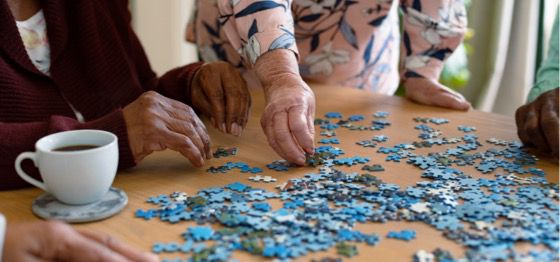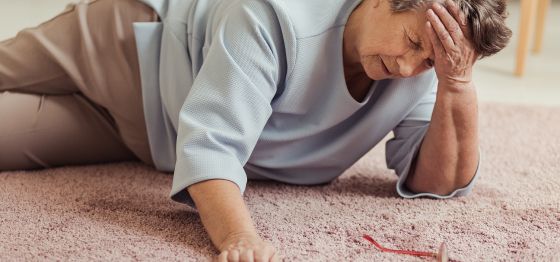Aging is influenced by many factors some of which, like genetics, are outside a person’s control. Others, however—like activity, nutrition, preventive medical care and mental/emotional self-care—we can do something about. Research supported by the National Institute on Aging has identified things older adults can do to manage health, live independently as long as possible, maintain quality of life and promote healthy aging.1
What is healthy aging?
The World Health Organization defines healthy aging as “the process of developing and maintaining the functional ability that enables well-being in older age.”2 Functional ability refers to the interaction between each individual’s intrinsic capacity—their mental and physical capacities including the ability to walk, think, see, hear and remember—and the environment in which they live. This means that freedom from disease or infirmity is not a requirement for healthy aging. Many older adults have health conditions that, when well controlled and well supported by the home, community and broader society in which they live, have little impact on their well-being.3
In terms of well-being, functional ability means having the capabilities that enable people to engage in activities that they value, including:4
- To meet their basic needs.
- To learn, grow and make decisions.
- To be mobile.
- To build and maintain relationships.
- To contribute to society.
6 tips for healthy aging
- Eat well. Focus on a diet that features fruits and vegetables, whole grains, lean meats and lower fat and sugar content. Hydration is important as well: Drink plenty of water.5 Studies have shown that even small, healthy changes in daily eating habits can improve health outcomes.6
- Stay active. Physical activity may help prevent, delay and/or manage chronic diseases. It improves balance and stamina, reduces the risk of falls and improves brain health.7 The Centers for Disease Control and Prevention (CDC) recommends that people aim for at least 150 minutes per week of moderate physical activity, like walking. That’s 20-30 minutes per day. The CDC also recommends engaging in muscle strengthening activity, like carrying groceries, at least 2 days per week.8
- Quit tobacco. Consult a doctor for support in decreasing and eventually stopping use of tobacco and tobacco products.9 Research shows that quitting smoking, at any age, will lower the risk of cancer, heart attack, stroke and lung disease, improve blood circulation, and improve senses of taste and smell. It’s never too late. One study showed that adults who quit between the ages of 55-64 added about 4 years to their lives.10
- Get regular checkups. Don’t wait until symptoms develop to see a doctor. Make annual appointments and stay up to date on age-appropriate diagnostic tests. Preventive care is designed to identify disease processes early, when treatment may be more effective.11 People who go to the doctor regularly also report improved quality of life and feelings of wellness.12
- Know family medical history. Ensure doctors and others involved in health care decisions are aware of relevant family history, particularly regarding disease, so that important health markers can be monitored to detect potential genetic conditions early.13
- Monitor brain health. Dementia is not a normal part of aging. Consult a doctor about the differences between normal age-related brain changes and signs of the early stages of dementia or Alzheimer’s disease.14
More ways to focus on healthy aging
Spend time with friends and family, including pets. Staying socially engaged may improve mental and physical well-being, promote longevity, lower stress and blood pressure and reduce the risk of depression.15 Feeling lonely can also impact memory. A study of more than 8,000 adults over the age of 65 showed that loneliness was linked to more rapid cognitive decline.16
De-stress. Older adults are at particular risk for stress-related problems. Researchers have found that levels of the stress hormone cortisol increase steadily after middle-age, which may drive changes in the brain.17 In addition to exercise, social connection and good sleep—all of which help lower stress levels—relaxation techniques including meditation, mindfulness practices, breathing exercises and meditative movement disciplines like tai chi and yoga may help lower stress and reduce its effects on the body.18
Sleep. It is recommended that adults over 18 aim for 7 to 8 hours of sleep every night. Adequate sleep has been shown to lower the risk of obesity, heart disease and stroke, reduce stress, inflammation and depression, and improve focus and concentration.19 Follow a regular sleep schedule and avoid napping late in the day. While exercise often improves sleep quality, don’t exercise too close to bedtime.20
Learn/experience new things. Take up a new hobby, leisure or social activity. The mental activity involved in learning something new, and the stress-relieving effects of doing something enjoyable, combat depression and may boost longevity.21 Get creative! Research found improvements in cognitive function, memory and self-esteem for older adults involved with music, theater, dance, creative writing and other participatory arts.22
Practice oral care. The American Dental Association recommends brushing twice a day, flossing once a day, and using a mouth rinse. See a dentist regularly for cleanings and checkups. The mouth is a welcoming environment for many kinds of bacteria and infections, and gum disease has been linked to heart disease, stroke and pneumonia.23
“Aging gracefully” is an aspiration for older adults. But what does it mean? Living a grace-full life, in older age, isn’t about trying to look younger. It’s about having the physical and mental health to enjoy life as much as those who are younger. Healthy aging is about quality of life, not just what we see in the mirror.24
Go365 by Humana® makes wellness fun and easy. We help Humana Medicare members with Go365® on their plan reach health goals as well as take care of their physical and emotional health—allowing members to thrive at any age.
Humana Medicare members with Go365 on their plan can enroll in Go365 at
Go365 is a well-being and rewards program for many Humana Medicare Advantage members. To learn more about Humana Medicare Advantage, call to speak with a licensed Humana sales agent at 1-844-321-5843 (TTY:711), Monday – Friday, 8 a.m. – 8 p.m. local time or visit
If you need to enroll in Medicare Advantage or change your plan outside of the usual Medicare Annual Election Period, a Special Election Period (SEP) could be the answer. For information on eligibility, visit Humana’s
Sources:
1“What Do We Know About Healthy Aging?” National Institutes of Health, last accessed September 27, 2022,
2“Healthy aging and functional ability,” World Health Organization, last accessed September 27, 2022,
3“Healthy aging and functional ability.”
4“Healthy aging and functional ability.”
5“How to Live Your Best Life as You Age,” Healthline, last accessed September 27, 2022,
6“What Do We Know About Healthy Aging?”
7“6 Tips for Healthy Aging,” Centers for Disease Control, last accessed September 27, 2022,
8“6 Tips for Healthy Aging.”
9“6 Tips for Healthy Aging.”
10“What Do We Know About Healthy Aging?”
11“6 Tips for Healthy Aging.”
12“What Do We Know About Healthy Aging?”
13“6 Tips for Healthy Aging.”
14“6 Tips for Healthy Aging.”
15“How to Live Your Best Life as You Age.”
16“What Do We Know About Healthy Aging?”
17“What Do We Know About Healthy Aging?”
18“How to Live Your Best Life as You Age.”
19“How to Live Your Best Life as You Age.”
20“What Do We Know About Healthy Aging?”
21“How to Live Your Best Life as You Age.”
22“What Do We Know About Healthy Aging?”
Go365 is not an insurance product and is not available with all Humana health plans. This is a general description of services which are subject to change. Product features may vary by client. Please refer to Customer Support for more information.
Humana is a Medicare Advantage HMO, PPO and PFFS organization and a stand-alone prescription drug plan with a Medicare contract. Humana is also a Coordinated Care plan with a Medicare contract and a contract with the state Medicaid program. Enrollment in any Humana plan depends on contract renewal.




